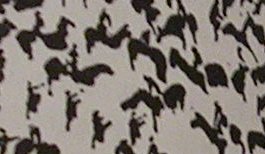Book Review: Kinsella's The Táin 17 years, 9 months ago by Martey Dodoo
I first heard about the Táin Bó Cúailnge during high school. I was reading an article in The Atlantic describing an author's attempts at retracing the journey that Queen Medb took during the epic. I only became interested in reading it, though, after listening to the Decemberists' EP, which takes its inspiration from the epic.[1]
The story is extremely similar to the Iliad. King Ailill and Queen Medb of Connacht invade Ulster in order to capture a brown bull with supernatural attributes so that Ailill's and Medb's herds will be exactly equal. Since the men of Ulster are suffering from pangs caused by a curse, it falls to the young Cúchulainn to singlehandedly defend Ulster. Stationing himself at a ford, Cúchulainn stops the entire army of Connacht from advancing by challenging a champion a day to single combat. As the men of Connacht realize that to face Cúchulainn is to die, Ailill and Medb convince several warriors to fight by offering them the hand of their beautiful daughter Findabair. Eventually, the Ulstermen rise and defeat Connacht.

I read somewhere (probably Wikipedia, although I am not sure) that Thomas Kinsella's translation was the one to read, so I picked it up from Lamont.[2] One of the more interesting parts of the book are the 31 drawings by illustrator Louis le Brocquy. While minimalist, they are still evocative of the violence of the epic. While it is not Achilles braining Trojan warriors with stones, the Gáe Bulg and warp spasm are still pretty intense.
The Gáe Bulg had to be made ready for use on a stream and cast from the fork of the toes. It entered a man's body with a single wound, like a javelin, then opened into thirty barbs. Only by cutting away the flesh could it be taken from that man's body.
I recommend reading it, especially if you like mythology or people getting fatally wounded in creative ways.
--
[1] My favorite section of the five-part song (at eighteen minutes long, it is a mini-epic in itself) is Part III. Any song with a "chorus of waifs" is likely to be a good song.
[2] It was one of the three books I checked out before graduating.